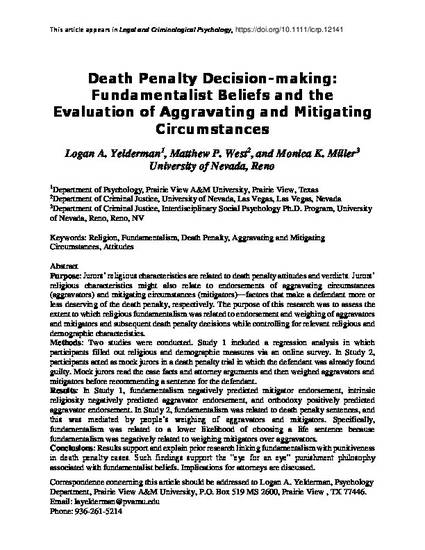
Article
Death Penalty Decision-making: Fundamentalist Beliefs and the Evaluation of Aggravating and Mitigating Circumstances
Legal and Criminological Psychology
(2019)
Abstract
Purpose: Jurors’ religious characteristics are related to death penalty attitudes and verdicts. Jurors’ religious characteristics might also relate to endorsements of aggravating circumstances (aggravators) and mitigating circumstances (mitigators)—factors that make a defendant more or less deserving of the death penalty, respectively. The purpose of this research was to assess the extent to which religious fundamentalism was related to endorsement and weighing of aggravators and mitigators and subsequent death penalty decisions while controlling for relevant religious and demographic characteristics.
Methods: Two studies were conducted. Study 1 included a regression analysis in which participants filled out religious and demographic measures via an online survey. In Study 2, participants acted as mock jurors in a death penalty trial in which the defendant was already found guilty. Mock jurors read the case facts and attorney arguments and then weighed aggravators and mitigators before recommending a sentence for the defendant.
Results: In Study 1, fundamentalism negatively predicted mitigator endorsement, intrinsic religiosity negatively predicted aggravator endorsement, and orthodoxy positively predicted aggravator endorsement. In Study 2, fundamentalism was related to death penalty sentences, and this was mediated by people’s weighing of aggravators and mitigators. Specifically, fundamentalism was related to a lower likelihood of choosing a life sentence because fundamentalism was negatively related to weighing mitigators over aggravators.
Conclusions: Results support and explain prior research linking fundamentalism with punitiveness in death penalty cases. Such findings support the “eye for an eye” punishment philosophy associated with fundamentalist beliefs. Implications for attorneys are discussed.
Disciplines
Publication Date
2019
Citation Information
Logan A Yelderman, Matthew P. West and Monica K. Miller. "Death Penalty Decision-making: Fundamentalist Beliefs and the Evaluation of Aggravating and Mitigating Circumstances" Legal and Criminological Psychology (2019) Available at: http://works.bepress.com/loganyelderman/3/
